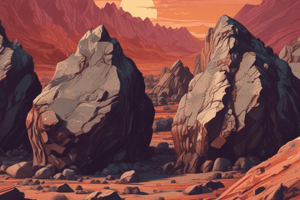Podcast
Questions and Answers
Which of the following is true based on your observation of intrusive igneous rocks on Earth's surface?
Which of the following is true based on your observation of intrusive igneous rocks on Earth's surface?
- These rocks can be found exposed due to uplift and erosion. (correct)
- Intrusive igneous rocks never change.
- These rocks are purely volcanic.
- These rocks are always found below the surface.
Match the following intrusions with their descriptions:
Match the following intrusions with their descriptions:
Sill = Injected parallel to sedimentary layers, nearly horizontal orientation Dike = Cuts across sedimentary layers, nearly vertical orientation
Rank the following events in order from oldest to youngest in age.
Rank the following events in order from oldest to youngest in age.
- Magma is injected far below Earth's surface cutting through sedimentary rocks; 2. Magma crystallizes and a Dike is formed; 3. Sedimentary country rocks are eroded away; 4. Humans build a tunnel and road through the resistant igneous rocks.
Based on observations from the two previous photos, which sketch is the most accurate?
Based on observations from the two previous photos, which sketch is the most accurate?
What is the best interpretation for how the porphyritic texture of these rocks formed?
What is the best interpretation for how the porphyritic texture of these rocks formed?
Ultramafic rocks contain __________ and are commonly found in __________.
Ultramafic rocks contain __________ and are commonly found in __________.
What is an accessory mineral?
What is an accessory mineral?
Which of the following best describes the difference between granite and rhyolite?
Which of the following best describes the difference between granite and rhyolite?
What is the rock name of an intermediate rock with two distinct grain sizes?
What is the rock name of an intermediate rock with two distinct grain sizes?
What do pumice and scoria have in common?
What do pumice and scoria have in common?
Flashcards are hidden until you start studying
Study Notes
Intrusive Igneous Rocks Overview
- Intrusive igneous rocks are exposed through geological processes such as uplift and erosion.
- These rocks form from magma that cools and solidifies beneath Earth's surface.
Types of Intrusive Bodies
- Sills are tabular intrusions that run parallel to sedimentary layers, appearing nearly horizontal.
- Dikes cut across sedimentary layers, exhibiting a nearly vertical orientation.
Timeline of Intrusive Activity
- Magma injections occur below Earth's surface, cutting through sedimentary rock layers.
- Once magma crystallizes, it forms a dike which can resist erosion more than surrounding country rock.
- Erosion eventually exposes intrusive features, leading to significant geological formations.
- Human activities, such as building tunnels, adapt to these resistant igneous structures rather than circumvent them.
Pie Town Dike Observations
- The Pie Town Dike comprises dark fine-grained igneous rock surrounded by paler sedimentary layered sandstones.
- The "baked" margin represents sedimentary rock that underwent thermal alteration due to the close proximity of the magma.
- Observers note that certain sandstone layers demonstrate increased resistance to erosion compared to the dike material.
Igneous Rock Textures
- The cooling rate of magma affects crystal size in igneous rocks: slow cooling creates larger crystals, while rapid cooling results in smaller crystals.
- Porphyritic texture shows a combination of larger crystals in a finer matrix, indicating varying cooling rates during solidification.
Classification of Igneous Rocks
- Ultramafic rocks, primarily containing olivine, are typically found in Earth's mantle.
- Accessory minerals constitute a minor component of a rock's overall mineral makeup.
- Granite is a phaneritic texture rock, while rhyolite is characterized by an aphanitic texture, showing differing crystal sizes.
- Andesite porphyry is identified as an intermediate rock with two distinct grain sizes.
- Pumice and scoria both contain gas bubbles, contributing to their lightweight and porous characteristics.
Studying That Suits You
Use AI to generate personalized quizzes and flashcards to suit your learning preferences.




